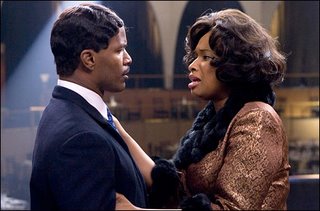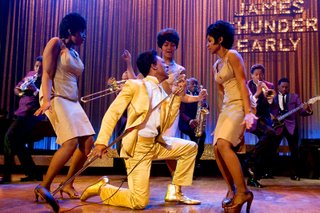The very white and respectable audience I saw DREAMGIRLS with couldn’t help but break into applause for the actress, almost convinced that her celluloid self could appreciate the gesture. How often can you apply the term “showstopper” to film?
The movie has many such marvelous moments, and many marvelous performances. Eddie Murphy stands out in a surprisingly non-Eddie Murphy role – giving us a solid glimpse into the actor that Mr. Murphy will mature into. Even Beyonce Knowles transcends her pop status to give depth to a pop star character.
However, the flick isn’t quite able to transition itself from stage play to film. There is a grace inherent in live performances when the characters start singing to nobody in particular (or even spouting out “Now is the winter of our discontent”); because, after all, there is an audience there, even if the fourth wall is supposed to keep the character from knowing that.
That grace doesn’t extend as easily to film, so the director has to work harder to establish that this is a world naturally containing gratuitous acts of music. Baz Luhrman did this in MOULIN ROUGUE by creating a reality so romantically unreal one couldn’t help but sing. And the marvelous Bill Condon created an inner life of imagination for Roxy Hart, thus giving us the most perfect recent musical film, 
If only DREAMGIRLS Bill Condon consulted with CHICAGO Bill Conden. DREAMGIRLS justifies the music by showing all the singing springing from the recording studio or performances of The Dreams. Except when it doesn’t (such as the aforementioned
The wishy-washy hybrid makes for an uneasy audience, requiring far too much time for us to let go and give in to the music.
The other big problem is one that was knotty with the stage version as well: trying to tell too much story in too little time. The film comes off as unfocused, unsure of whether this is Effie’s story (the character with the biggest arc, but she disappears half way through) or Deena’s story (who is a cipher for the first half plus), or Curtis’ story (a character that doesn’t arc) or, heck, even Early or C.C. or Lorell’s story.
We track all these characters over a decade plus, zipping from one song to another so rapidly as to be unable to create an emotional attachment. Sure, as an audience, we have moments of connection – but far too many more moments of disconnect.
Not to say that a film can’t effectively tell dozen stories at once. I also recently viewed John Sayles’
They are even similar in their language – both heavily relying on con versations that mean more than they mean – STATE with lines like Marly’s repeated “What’s important is to keep smiling, even if you’re drowning,” or Furman’s classic, “You can’t live next to the ocean and be afraid of the water.” And DREAMGIRLS with all the songs – each masquerading as a pop tune playing on the radio, while really being the inner voices of the characters breaking the surface.
versations that mean more than they mean – STATE with lines like Marly’s repeated “What’s important is to keep smiling, even if you’re drowning,” or Furman’s classic, “You can’t live next to the ocean and be afraid of the water.” And DREAMGIRLS with all the songs – each masquerading as a pop tune playing on the radio, while really being the inner voices of the characters breaking the surface.
Both movies are intended to be lyric poems; yet DREAMGIRLS never seems to let the poetry steer the story.
Two things that Sayles did right: first, he focused his multiple stories over a short period of time – five days in May. The focus lets us settle a bit; we don’t need the full life of these characters, just enough to see us through this pivotal change.
And second, he lets each scene sit for a spell; he takes his time. Telling a dozen stories in two hours doesn’t mean rushing.
And DREAMGIRLS rushes, pushing from moment to moment in a breathless pounce, hoping to get it all said before the clock runs out. As a result, some of the best scenes of the story never make it into the film.
Danny Glover’s Marty tell s us that Effie had been trying to sing again, but melts down in front of her audiences. He tells us that. Come on, after seeing Hudson mix vulnerability and power with so many moments prior to this, aren’t we all dying to SEE her take her brassy self in front of a club and struggle, and struggle, and lose…?
s us that Effie had been trying to sing again, but melts down in front of her audiences. He tells us that. Come on, after seeing Hudson mix vulnerability and power with so many moments prior to this, aren’t we all dying to SEE her take her brassy self in front of a club and struggle, and struggle, and lose…?
How can you choose not to show that moment? Instead, it is an aside, quickly tossed so we can rush to the final performance of the Dreams.
DREAMGIRLS is a good movie. Which is too bad; it could’ve been great.
Just my thoughts,
Sean
2 comments:
I have not seen the film yet, but I was lucky enough to be working in the entertainment press in Boston on the night that "Dreamgirls" opened for out-of-town tryouts. So I got to see/hear Jennifer Holliday sing that amazing song live for the first time! So many years later, I still remember the power of that performance. I am looking forward to hearing Jennifer Hudson in the film.
Can I say jealous?!!
I saw the Broadway revival; still amazing, but not the Holliday performance.
Still, I don't you will be disappointed. The new Jennifer H. makes this part her own.
Enjoy the movie!
Post a Comment